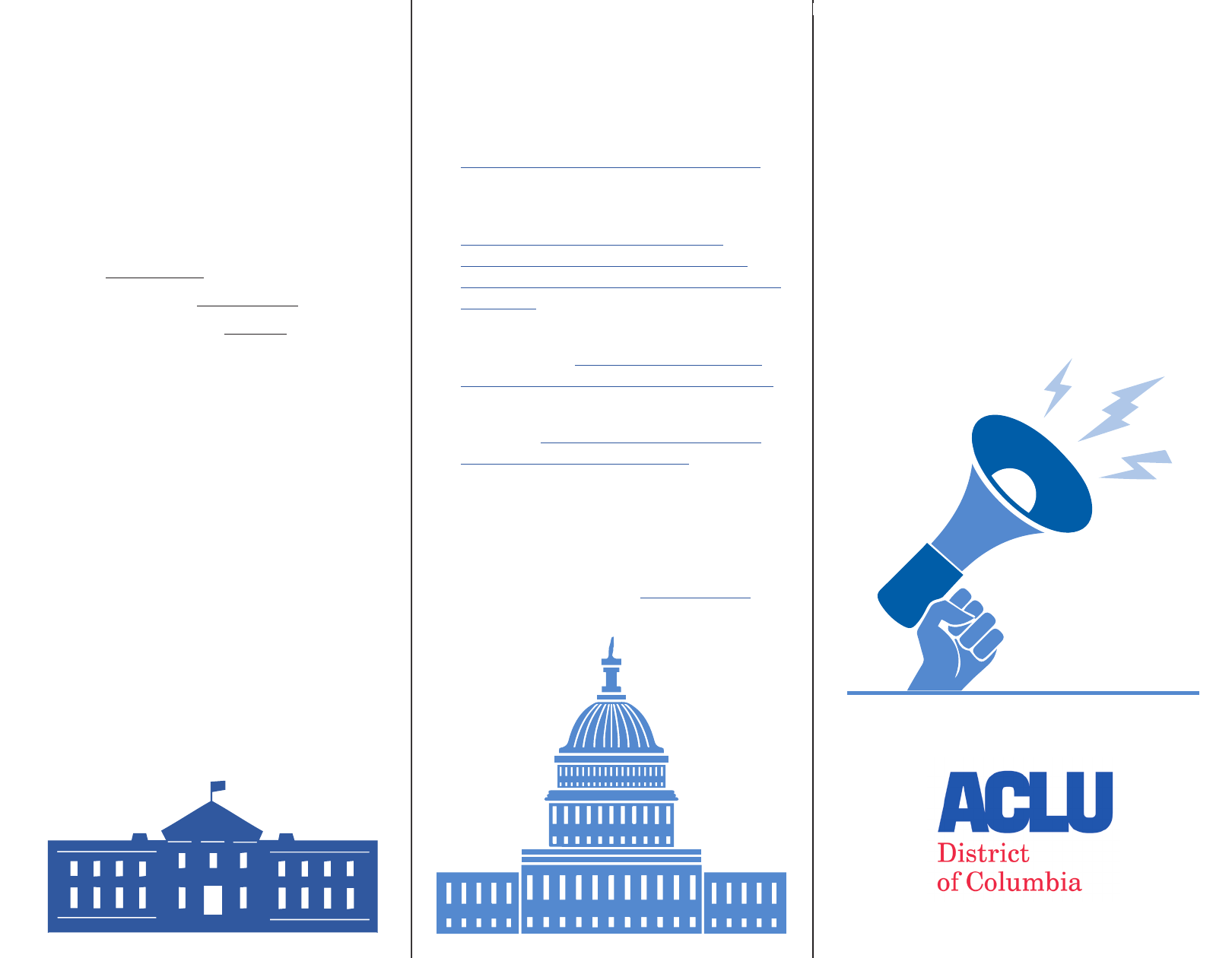
As a government employee, you still have a First
Amendment right to speak out on important
issues. However, your government employer
also has an interest in promoting an effective
and efficient workplace. In this guide, we break
down your speech rights under the Constitution.
As a general matter, if you are speaking
(1) as a private citizen,
(2) about a matter of public concern, and
(3) your speech does not interfere with your job,
your speech is protected.
However, there are exceptions. You can use the
flowchart inside this guide to help you figure out
whether or not particular types of speech are
likely to be legally protected.
This guide does not provide specific legal advice,
but rather provides an overview of this complex
area of law. If you believe your rights have
been violated, contact your agency’s Inspector
General, or the ACLU!
RESOURCES:
» For more information about the Hatch Act, visit
https://osc.gov/Pages/HatchAct-FAQs.aspx.
» For more information about the Hatch Act’s
specific rules regarding social media, visit
https://osc.gov/Pages/The-Hatch-Act-
Frequently-Asked-Questions-on-Federal-
Employees-and-the-Use-of-Social-Media-and-
Email.aspx.
» For more information about whistleblower
protections, visit http://www.whistleblowers.
org/resources/faq-page/know-your-rights-faq.
» For FAQs regarding public employees’ speech
rights, visit https://www.workplacefairness.
org/retaliation-public-employees.
If you believe your rights have been violated,
contact your agency’s Inspector General, or the
ACLU!
» You can contact the ACLU of DC at
[email protected] or visit www.acludc.org.
Federal Employee
Speech & the First
Amendment:
A Know-Your-
Rights Guide
[email protected] | www.acludc.org

START HERE
(Please note these are general principles—not legal advice.
Contact an attorney if you have questions or need more information)
Are you a high-level employee, or a political appointee?
What is a “high-level employee”?
Generally, this means an employee who has “broad responsibilities
with respect to policy formulation, implementation,
or enunciation” at the employee’s government office.
What is a “matter of public concern”?
Speech that is of political, social, or other concern to the community.
Speech that would help the public make informed decisions about
how government operates (e.g., a teacher’s public comment
at a community meeting about the school board budget).
Not: Internal personnel disputes and grievances.
Are you speaking about a matter of public concern?
Is this type of speech normally part of your job duties
and/or are you speaking in your official capacity?
Speech about non-confidential information learned on the job
may be protected, as long as the speech is not part of your job
(e.g., an employee at a homeless shelter who knows the shelter is
turning people away can write a blog post advocating more funding).
Does your speech disrupt your employer’s
interest in an efficient workplace?
When does speech disrupt an efficient workplace?
It depends. Relevant factors include the manner, time, and place
of the speech; whether the speech impairs discipline by superiors
or harmony among co-workers; whether the speech detracts from
work relationships that require loyalty and confidence; and whether
the speech impedes performance of the employee’s duties or the
office’s operations generally. The extent of disruption is balanced
against the speaker’s interest in the speech in question.
Your speech may be protected!
Your speech is not protected.
BUT
Even if your speech is
protected, you should be
aware of whether your
agency has additional rules
governing employee speech.
E.g. the State Department’s
guidance on social media use
and public communications:
http://www.afsa.org/
socialmedia.aspx.
Your speech may be otherwise
limited by the Hatch Act.
(These are very general principles.
For more information, please visit
https://osc.gov/Pages/HatchAct-
FAQs.aspx.)
What does that mean?
Your employer may not, because of your speech, fire,
demote, or suspend you, significantly change the terms and
conditions of your employment, or (as interpreted by most
federal courts) take any action that would likely deter a
reasonable person from speaking.
An employer has acted “because of your speech” where the
speech was a “substantial or motivating factor” behind the act.
But your employer always can take adverse actions for a
legitimate reason, and it would have the opportunity to show
that it would have taken the same action in the absence of the
protected speech at issue.
You may:
• Contribute money to partisan
groups and candidates in
partisan elections
• Be active at political rallies and
meetings, and in partisan groups
• Express opinions about political
issues and partisan groups and
candidates while not at work or
using official authority
You may not:
• Invite subordinate employees to
political events or suggest that
they engage in political activity
• Knowingly encourage
or discourage political activity
of people you work with
• Solicit, accept, or receive
political contributions
• Engage in political activity
(including on social media) while
on duty, in the workplace, wearing
a uniform or official insignia, or in
a government vehicle
You may be protected against retaliation for
whistleblowing (reporting employer actions that are
illegal, abusive, or violate specific public policies).
For more information about how you may be protected as
a whistleblower, and how to make a claim in response to
retaliation, please visit http://www.whistleblowers.org/
resources/faq-page/know-your-rights-faq
YES
BUT
Are you seeking to release classified
(or otherwise sensitive) information?
NO
NOYES
NO YES
NOYES
NOYES
Your employer may take adverse action (e.g. firing,
demoting, suspending you) because of your speech.
